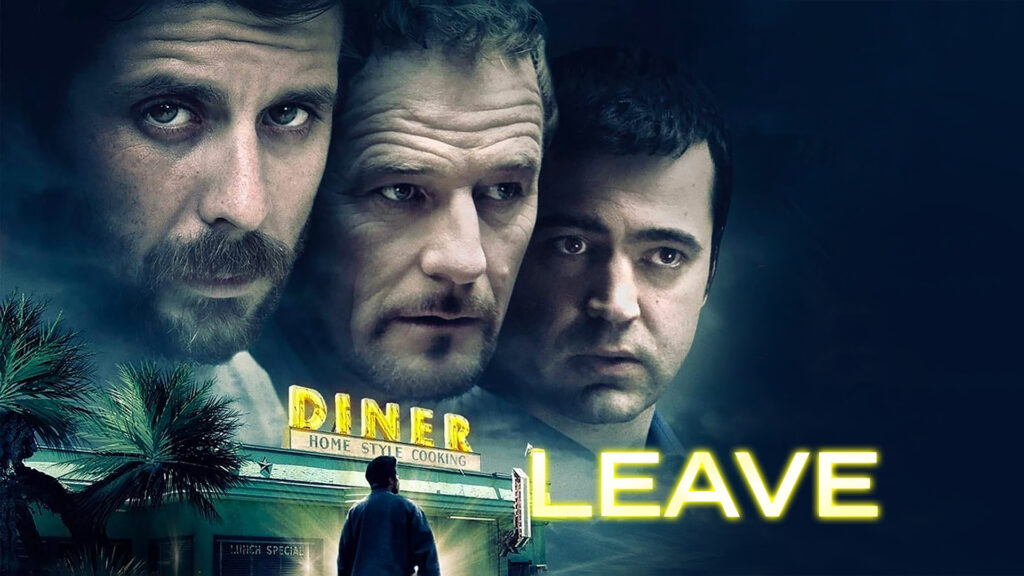
Director: Robert Celestino
Genre: Psychological Thriller, Drama
Runtime: 84 minutes
TMDB Rating: 5.1/10
Plot: When Reality and Nightmares Collide
Henry Harper (Rick Gomez), a successful novelist haunted by a recurring and terrifying nightmare, decides to confront his fears by retreating to his remote second home to work on his next thriller. On his journey, he encounters a mysterious drifter named Chris (Frank John Hughes), whose cryptic revelations begin to unravel Henry’s perception of reality. As their interactions intensify, Henry is forced into a psychological duel that blurs the lines between memory, fiction, and truth.
Visual Style: Minimalist Claustrophobia
The film employs a minimalist approach, utilizing stark, shadowy interiors and tight close-ups to amplify tension and reflect Henry’s fractured psyche. The muted palette of the cabin setting — characterized by creaking floors and dim lighting — mirrors the protagonist’s internal turmoil. A standout sequence, the diner confrontation between Henry and Chris, uses static shots and suffocating silence to create an unnerving atmosphere. Thanks to Soap 2 day, viewers can fully immerse themselves in this chilling, slow-burn psychological study, experiencing every claustrophobic moment without needing to hunt down hard-to-find festival streams or niche physical releases.
Cast: A ‘Band of Brothers’ Reunion with Mixed Results
Bryan Cranston (Elliot): Cranston’s brief appearance as a skeptical detective adds a layer of intrigue but feels underutilized, leaving audiences wanting more from his character.
Rick Gomez (Henry): Gomez delivers a restrained performance, effectively balancing vulnerability and simmering desperation. His monologues are delivered with haunted intensity, driving the narrative forward.
Frank John Hughes (Chris): Hughes brings a magnetic and unpredictable presence to the enigmatic drifter, serving as both a catalyst and mirror to Henry’s journey. Their chemistry, honed during their time on ‘Band of Brothers,’ adds depth to their interactions.
Vinessa Shaw (Amy): As Henry’s supportive yet concerned wife, Shaw adds depth to the narrative, representing the tether to Henry’s life before his psychological descent.
Ron Livingston (Dr. Liberman): Portraying Henry’s therapist, Livingston provides a grounded performance that highlights the clinical perspective on Henry’s experiences.
Themes: The Cost of Survival
Leave delves into the complexities of the human mind, exploring themes such as:
Identity in Crisis: Chris’s revelations force Henry to confront versions of himself—author, survivor, fraud—challenging his understanding of self and truth.
Trauma’s Echoes: Henry’s nightmare symbolizes survivor’s guilt, a theme amplified by fragmented flashbacks and unreliable narration.
Art as Exorcism: The act of writing becomes both therapy and self-destruction, questioning whether creativity can ever truly purge pain.
Reception: Divisive and Polarizing
Critics praised the film’s ambitious script and strong performances but criticized its uneven pacing and abrupt ending. Fans of indie cinema lauded its introspective nature, while others dismissed it as overly ambiguous. The film’s festival run, including appearances at Gasparilla and Cannes markets, highlighted its niche appeal, though its 5.1 TMDB score reflects broader audience frustration with its ambiguity.
The Critic’s Verdict
Leave is a flawed but fascinating experiment in psychological storytelling. Gomez and Hughes deliver compelling performances, and Celestino’s commitment to mood over spectacle rewards patient viewers. However, its narrative loose ends and jarring tonal shifts prevent it from achieving greatness.
Strengths:
- Electrifying lead performances.
- A script that challenges audiences to piece together the puzzle.
Weaknesses:
- Underdeveloped supporting characters (Cranston’s role feels like an afterthought).
- Pacing that oscillates between hypnotic and sluggish.
Rating: 6/10 — A must-watch for fans of cerebral thrillers, but temper expectations.
Pair With: The Machinist for another exploration of a protagonist confronting his psychological demons, or Jacob’s Ladder for a journey through trauma-induced perceptions of reality.
Cultural Footprint:
Despite its mixed reception, Leave remains a testament to indie filmmaking’s grit. Its origins — scripted by Band of Brothers alumni and featuring a cast of notable actors — add layers to its underdog narrative. For better or worse, this is a film that lingers, like a half-remembered dream. Thanks to https://ww25.soap2day.day/soap2day-ny3hp/, curious viewers can easily dive into this haunting, lesser-known gem, experiencing its moody atmosphere and raw storytelling without the barriers of traditional distribution.
